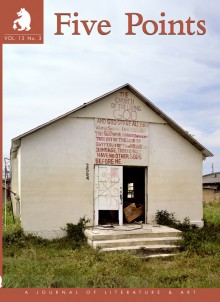Five Points, Vol. 13 No. 3
Spring 2010This is the excerpt lorem ipsum dolor sit amet, consectetuer adipiscing elit, sed diam nonummy nibh euismod tincidunt ut laoreet dolore magna aliquam erat volutpat. Ut wisi enim ad minim veniam, quis nostrud exerci tation ullamcorper.
Sample Content
Edward Hower
Children of the Maze
Jaipur, India
Entering the prison complex, I recalled shadows of similar places falling over me, and nearly turned back. Then behind a window I saw a woman who must have been the social worker I’d contacted about my visit. A blurred figure, she seemed to be pressed against the heavy glass as she stared out at me. I stepped up to the main gate. A buzzer rasped, the gate’s steel teeth slid sideways; when I’d stepped inside, it clanked shut behind me, making the floor shudder beneath my feet.
Mrs. Romila Sharma and I exchanged stiff namasté greetings, each pressing palms together. Her supervisor had ordered her to take me around, she said in a weary voice. In focus, she looked alarmingly thin, and too young—30 at most—for the gray streaks in her hair. Her pale blue sari was gathered around her so tightly that her movements made only faint whispers.
“I’m new to this posting but I will try to show you…” She narrowed her eyes at me. “Professor, what is it you are looking for here?”
In my letter to her supervisor, a friend of one of my colleagues at the University of Rajasthan, I’d said I hoped to explore research possibilities for my Fulbright grant, and offered to teach English to make myself useful. I’d written about my experience teaching in prisons, and the five years I’d spent counseling delinquents in reform schools a decade ago. The taut, wary look on Mrs. Sharma’s face reminded me of an expression I’d often seen in my mirror during my own years as a social worker. Suddenly I missed those kids, and for a moment felt an old worry that I might have cause some of them more harm than good by intervening in their lives.
“I’ll be interested in anything you can show me,” I said, wishing I could have been less vague.
“Yes, all right.” Adjusting her sari at the shoulder, she walked ahead of me down a long, twisting corridor. Somewhere farther inside the prison more gates crashed shut; I felt metallic echoes gust against my face as they rushed through the tunnels. Some guards marched past me in khaki uniforms with kepi-like billed caps; they reminded me of soldiers at the desert fortress in Beau Geste, the old film about a French Foreign Legion outpost.
We were in the men’s detention area, most of which, as a woman, she couldn’t take me to. A few prisoners, wearing gray drawstring pants and sleeveless gray shirts, kept their eyes to the ground as they passed us. Inside an empty barracks, double-decker beds were neatly made; the scoured floors gave off a dizzying tang of ammonia. We walked outdoors and crossed a sandy courtyard to the factory where the convicts were at work. Like the other buildings, its high crenellated roofline was topped by coils of razor wire like elaborate man traps. Through a window, I could make out men at benches assembling what looked like office desks. Massive robotic machines clattered as if in a frenzy to bash their way out. The entrance was locked, and the racket swallowed the sound of Mrs. Sharma’s small fist rapping on the door.
“They tell me I am to show you this building—then no one will let me in!” Scowling, she wiped beads of sweat from her face, smudging the dark mascara around her eyes.

